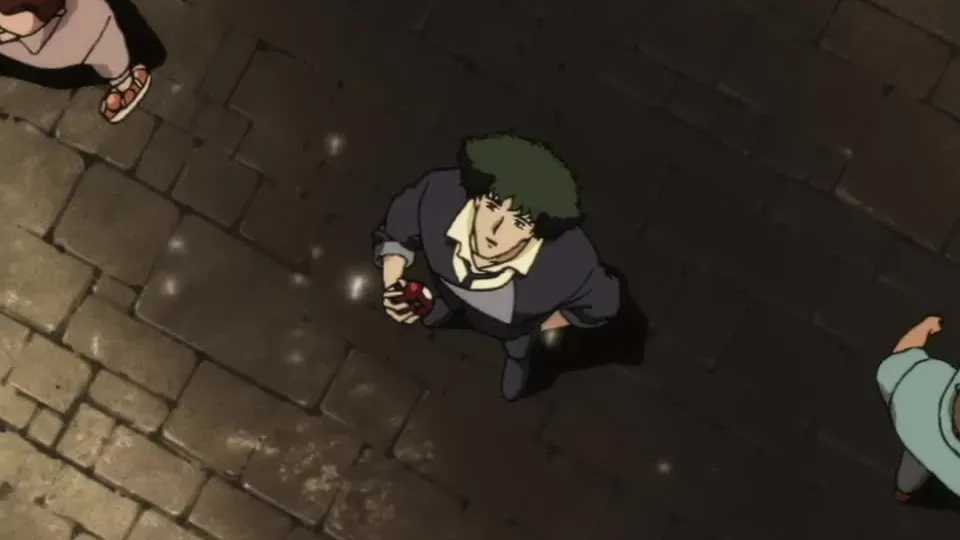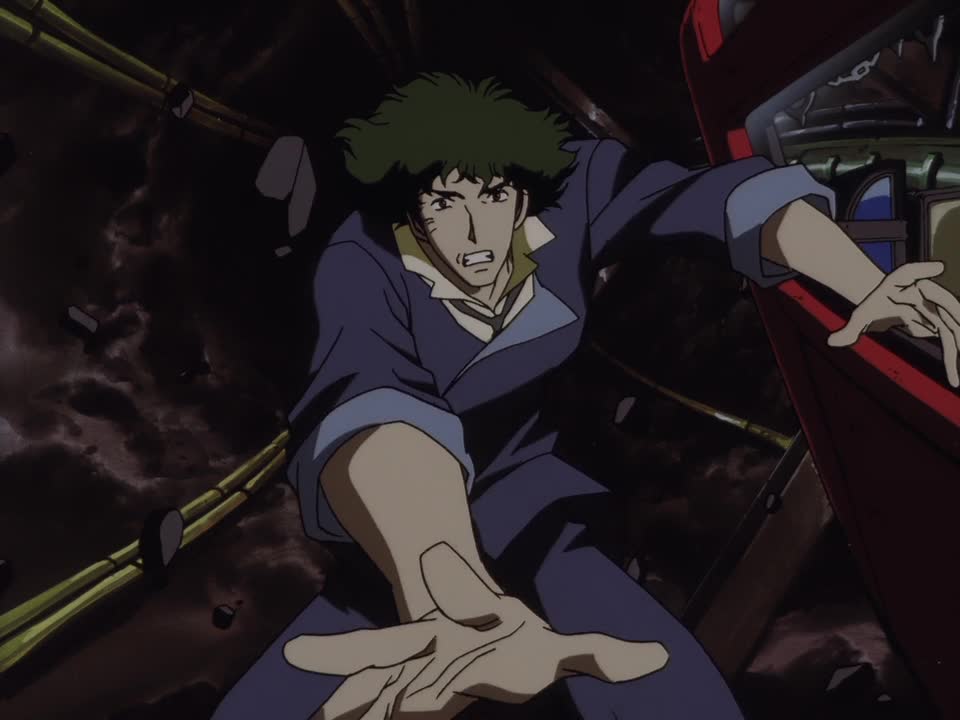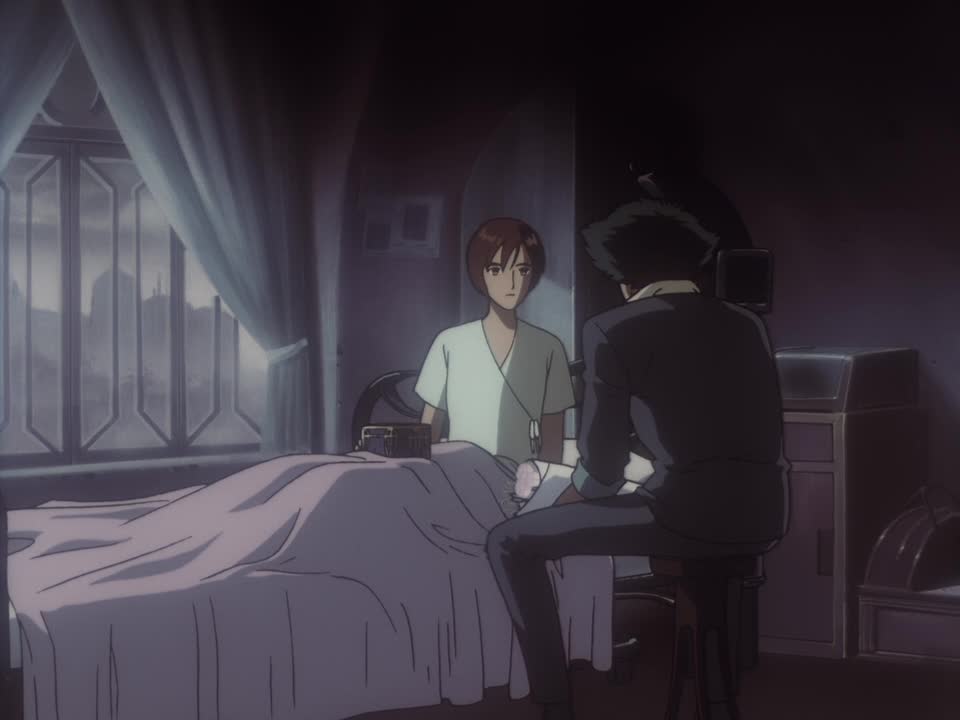Cowboy Bebop: "Heavy Metal Queen" and "Waltz for Venus"
In which the show is trying things, and I appreciate it (even if it doesn't always work)

(This is the fourth installment of my biweekly recaps of Cowboy Bebop, the TV Tokyo animated series that ran from 1998 to 1999 to cult fascination and critical acclaim. I’ve never seen it! These recaps are only available to paid subscribers.)
- “Heavy Metal Queen” (originally aired April 17, 1998 [TV Tokyo], December 5, 1998 [Wowow] and September 24, 2001 [Adult Swim])
- “Waltz for Venus” (originally aired April 24, 1998 [TV Tokyo], December 12, 1998 [Wowow] and December 24, 2001 [Adult Swim])

From the moment I started talking about covering Cowboy Bebop in this space, I've been informed, several times, that this show has "some weird gender stuff." I'm aware of Ed, of the ambiguous gender, which is handled either extremely well (for the '90s) or extremely poorly (for right now), or which is maybe just handled quirkily, like a trans character in a David E. Kelley show. But we'll get to Ed in the next recap.
In the meantime, here's VT, a character so obviously trans that the first recommended Google search is "VT Cowboy Bebop Gender." Within the show, VT uses exclusively she/her pronouns, so I will do that as well, but I found readings from trans people who dig the show that suggested she was everything from a cis, butch bisexual woman to a trans man to an early-transition trans woman. Obviously, there's no need for the show to have VT earnestly talk about her gender or sexuality. She's simply a rad space trucker who hates bounty hunters and loves her cat. Do you need more than that?
I'm thinking about VT in terms of 1990s sci-fi attitudes around gender. A book like Steel Beach by John Varley could posit a future where humans lived on the moon and switched genders like you might get a haircut. The book's protagonist is, in essence, genderfluid and is even named Hildy Johnson, after the male character in The Front Page who became a woman when the story was transmuted into His Girl Friday. In the book, Hildy starts as a man, then transitions to a woman, and their pronouns change with them. There are, obviously, many genderfluid people who use he or she pronouns when wearing outfits traditionally associated with one gender or another, and there are lots and lots of people who are happy to use any pronouns.
But Steel Beach never feels like it's thought about what a world where gender is as interchangeable as the outfit you're wearing. Its idea of "I was a man, and now I'm a woman, and I'll be a man again" strikes me as a rather timid way to imagine what such technology would actually result in. (Or maybe I would say this because one of my earliest fiction efforts was a story about a world where nanotechnology made changing one's gender incredibly easy, and the protagonist was grappling with the fact that her spouse had, effectively, transitioned. I wrote it shortly after reading Steel Beach, and hmmm...)
The more I talk to gender non-conforming people who were entering early adulthood in the 1980s and 1990s, the more I get the sense that trans identities were known about but not really understood and the divide between genders was treated as so insurmountable even within mainline progressive spaces that if you were someone who questioned their gender but didn't possess unbearable dysphoria, it was simply easier to slide along in your assigned gender at birth and never look too closely at how it made you feel. The idea of one's assigned gender being a kind of wearying task that must be carried out was really prominent within this generation of possibly trans people, and we're, honestly, only starting to emerge from that mindset.
Anyway, VT strikes me as Bebop playing around in this space, examining a character who might be trans or might be cis or might have transitioned but for a lack of the imagination of her creators. We don't get to know, nor do we have a right to know, necessarily. And I don't think VT is handled poorly at all. Her mere existence is a fascinating suggestion of the Bebop world's comfort with gender non-conformity, at least in a 1990s sense. This is about as far as a TV show would go in presenting someone who doesn't play neatly within societal gender lines in 1998. (It is kinda weird that she's just defined as straight, but that's probably also an offshoot of the 1998 of it all.)

Beyond that, I'm fascinated with how much these two episodes resemble episodes of something like The A-Team, more or less. Yes, Spike and the Bebop crew are important parts of the stories of each episode, but the guest characters are almost more important, especially in "Heavy Metal Queen," where much of the story is taken over by VT. The climax, especially, is one of the most exciting things the show has done so far, but it's almost entirely about VT's pursuit of Decker through a space minefield. (Decker is carrying a cargo of explosives, upping the ante even more.)
Indeed, if you think about Spike, Jet, and Faye's stories in both of these episodes, they largely consist of introducing us to the new characters whose stories we will follow, then popping into those stories every so often to, in essence, say, "Hey, here we are! We're still on the show!" Then they save the day at the end. "Waltz for Venus," for instance, is so focused on the relationship between a brother and sister, even if they share relatively little screentime together, that even the scenes Spike shares with her are mostly about what's up with her. The episode is also concerned with building out the world of terraformed Venus, so viewers have another location within the solar system to hang their hats on.
I found these two episodes a mixed bag. I adored "Heavy Metal Queen," both for VT and her cat and for the ways in which the story kept twisting in directions I didn't expect. The tenor of the episode is more or less set by that early scene where Faye mistakes a big, burly guy for Decker, only to realize that his "snake" tattoo is actually of an eel and the scrawny dude in the next booth is the actual Decker. It's like a nod toward the storytelling of the episode itself, which seems like it will be about Spike and company tracking down Decker but actually turns into something about another character entirely. The mission-of-the-week structure allows for this sort of bait-and-switch, and I often love episodes like this, at least if they don't become the whole show. You want to have some episodes focused on your regulars, where they're not being defined by the guest stars. But considering we just saw "Ballad of Fallen Angels" two episodes before this, the show is more than delivering on that front.
On the other hand, I wasn't as drawn to "Waltz for Venus," even as I suspect I might like it more on a rewatch. It's certainly gorgeous. That final image of Spike watching the seeds drift through the air is melancholy in a way the show hasn't been quite yet (even if there's a darker undercurrent here, since those spores caused the sister's blindness). And I quite liked how the episode was quiet and focused on conversation instead of action. But I didn't ultimately get drawn into the brother and sister's dilemma in the same way I did VT's in the episode before. Again, perhaps I would on a rewatch, where I could check out the episode in isolation. As it was, I felt like I was watching something gorgeous but ultimately a little hollow.
Yet at the same time, the mere existence of these two episodes back to back is a handy argument for why I'm getting into this show more and more as we go. They're two extremely different episodes in terms of tone, story beats, and character arcs, and they both relegate the regulars to playing supporting roles in the stories of other characters but manage to make those stories at least compelling in a tiny amount of screentime. When I think about what I adore about episodic storytelling, it's the ways in which shows like this can find new facets of themselves in one-offs. Even when those one-offs don't add up, the show benefits from stretching in a new direction. You can't keep doing the same exercises over and over, or you'll eventually start to get too used to them. In our modern era, too many shows get stuck in a well-worn groove. Bebop is certainly not in danger of that yet.
I am surprised at how little of an overarching story there is so far. The show's world is remarkably consistent, but even the sorts of story arcs you'd probably presume would be in a show like this are absent. Spike and Faye have a sort of sibling rivalry thing going on, rather than the will-they/won't-they they surely would have been thrust into on most other shows. That lack of serialization isn't a complaint just yet, but I do wonder how long the show can coast on Just Vibes.
Yet what am I worried about? I'm having a blast, and if this show has some weird gender stuff that leans into the very 1990s aesthetics of VT, hey, I'm here for it. We'll see how all of these things develop in the weeks to come.

Other thoughts I thought:
- "Waltz for Venus" was one of the two episodes Adult Swim most delayed for its initial US broadcast, and the network rolled it out on Christmas Eve in 2001, when viewership is traditionally very low. I assume that in the wake of Sept. 11, the network was a bit leery of the brief hijacking scene that takes place early in the episode. The only episode delayed longer (indeed, delayed until well into 2002) is, according to Wikipedia's plot summary about actual terrorist attacks. So.
- It doesn't seem like VT is going to become part of the regular crew, which is too bad. But I am especially sad that her cat won't be sticking around, because I think the cat and Ein should be friends.
- The little mid-episode title card in these two episodes featured a silhouette of some cows, and I really liked that particular image. That is all.
- I liked that VT's truck almost seemed to resemble a guitar in the sequence that opened "Heavy Metal Queen."
- I cannot emphasize enough how much I dug the final action sequence in "Heavy Metal Queen." Just some tremendously exciting twists and turns, with all characters doing some really cool, daring things.
- Let's check in with our main trio: Spike is just staying on the right side of "super mysterious" for me. When he gets out of his little ship and floats up into the near-gravity of the decrepit space station, it feels like his character in a nutshell: possibly possessed of a death wish, a little idiotic, extremely committed to whatever it is he happens to be doing in the moment.
- I continue to be... not upset by the portrayal of Faye but deeply confused by it. She seems to simultaneously be 16 and 35, and while I know she's in her early 20s, the character's thought processes and internal rhythms seem to change by the episode. I think I'm starting to figure her out, though I worry she's just a "sexy woman who uses that sex appeal to trick guys into doing stupid shit" archetype. She'll be my favorite character in one episode and barely there in the next.
- Speaking of characters who sometimes feel like they just sit out whole episodes: Jet Black is someone who is a vital part of the ensemble whom I feel like I barely know. That's less of a problem, because he seems like the taciturn type whose secrets will be revealed at a later date. For some reason, I'm thinking of Mike from Breaking Bad and Better Call Saul?
- The shuttle that takes the crew to Venus reminded me of the ship from the great Doctor Who episode "Midnight." The action sequence to take down the hijackers was also fun in how perfunctory it seemed. Spike and company are really good at what they do.
Next time: Ed! I've been told that Ed is someone I will like and someone I will hate. I'm excited to make a decision. Anyway, we'll go "Jamming With Edward" and check out the "Ganymede Elegy." (What an episode title!) See you on March 21!



